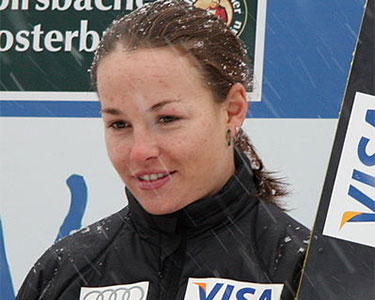One reporter’s (tiny) role in Sochi Olympic history

American ski jumper Lindsey Van in 2009. Photo: Jeses, Creative Commons, some rights reserved
This week, women athletes competed for the first time in Olympic ski jumping competitions, with Americans like Lindsey Van and Jessica Jerome soaring over Sochi.
Van finished a disappointing sixteenth place, but she still bookmarked her spot in Olympic history, having shattered one of the most ludicrous barriers in modern sport.
For decades, women were boxed out of ski jumping in large part because of resistance from European sports officials.
Missing the Vancouver Games four years ago was a particularly bitter pill to swallow.
The breakthrough this year was the result of dedicated activism and commitment to the sport on the part of hundreds of women athletes — they get all the credit here.
But I’ll admit to a little dose of pleasure that my reporting also played a small role in adding one more crack to the Olympic glass ceiling.
The moment came in 2005, when I was interviewing Gian-Franco Kaspar, still the head of the International Ski Federation and a member of the International Olympic Committee based in Geneva, Switzerland.
He told me point blank that the “girls” who wanted to jump on the same big hills as men just weren’t that good:
“If you have a field now in some ladies’ competitions with, let’s say, 30 girls, four or five of them really jump,” he argued.
“Don’t forget, it’s like jumping down from, let’s say, about two meters on the ground about a thousand times a year, which seems not to be appropriate for ladies from a medical point of view,” Kaspar added.
This “not appropriate for ladies” quote has resonated through the blogosphere ever since, maybe the one piece of reporting I’ve ever done that went truly viral. Google it and you’ll find thousands of hits, going back now nearly a decade.
At first, people would call me and ask to use the quote. I heard from ESPN, 60 minutes, and other major outlets. But eventually, Kaspar’s words just sort of floated free of any association with me, and they’re still echoing all these years later.
Asked about the quote just a few days ago by NBC News, Vann said bluntly that it made her “kind of want to vomit.”
At various times over the years, Kaspar has suggested that I quoted him out of context, or that his views were somehow misinterpreted. But that was nonsense, of course. (You can hear the audio here.)
Kaspar had articulated a view that is still held — privately and not so privately — by many men in sport, who feel that they, and not women, should decide when, where and how “the girls” should be allowed to compete.
I think it’s fair to say that anger over Kaspar’s statement helped to mobilize a stronger pro-women’s jumping movement, and made it more difficult for opponents to rationalize keeping women on the sidelines.
A decade or so after the story first aired, I’ll admit that I’m proud of that bit of reporting. Sometimes journalism really does have a real-world impact.
In this case, I like to think that I — along with NCPR and NPR — played some small role in clearing the path for the women who flew in Sochi.
Tags: olympics14








Good on ya! And maybe it will take less than a decade to allow them to jump on the large hill.
Journalism can be transformative.
Brian–unbeknownst to you, I still receive requests from other media for permission to use the clip of Kaspar from your story, most recently, about a week before the Olympics started from one of the major networks. On a personal note: I still vividly remember the moment as a teenager being told that I could not use the ski jump at one of the large Vermont ski centers because “women’s pelvic structure can’t withstand the impact.” No ski center in the country, at that time (okay, a very long time ago), permitted women to use jump facilities.
Ellen-times have changed-here in Macomb all ya gotta do
is ask!…D
Well, the IOC can be very slow to get with it.
Take distance running. Women were limited to nothing longer than 800 meters (the metric half-mile) up until 1972, when the 1500 was added. The women’s marathon wasn’t included until the ’84 Olympics.
Some old-school types have to be pushed. Thanks for helping move that along!
Sometimes movement need someone to say out loud what everyone in power is saying privately.